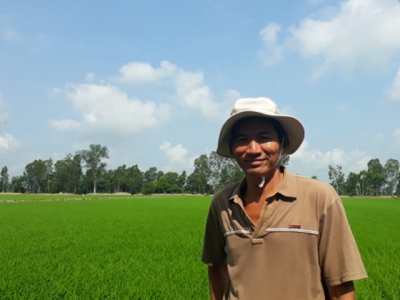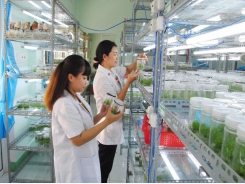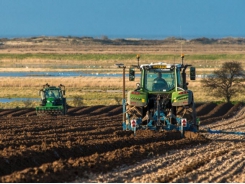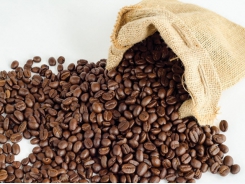Co-operatives and farmers on the way to standardizing their products

During a training class on practicing good agricultural standards for fruit, vegetable, and rice cooperatives, I asked why cooperatives and farmers hesitate to follow standards.
Mr. Cung Quang Tien by his family's LocalGAP rice field. Photo: KT.
One young co-operative director frankly said he found no benefit from being standardized. Another farmer said he did not spray pesticides for his field near the harvest day, but his neighbor used them and the chemical sprays flew over his garden so he said it was nothing to follow standards. “With people like that, how can we follow standards,” he asked.
Some others complained recording works were complicated so it was difficult for them to follow standards. Such words remind me of an agricultural service official saying that “advocating" farmers to standardize means the supporting team has to do everything for them including the figure recording because farmers think that standardizing is the work of the State and authority officials are responsible for setting standards for them. That is the issue.
Fortunately, not all farmers and cooperatives think so. A typical example is Truong Khuong Orchard Cooperative which belongs to a project on supporting cooperatives to follow GlobalGAP and LocalGAP standards. The cooperative’s director has patiently convinced the members at the same time taken advantage of supports from local agricultural officials and the Plant Protection Sub-Department to hold training courses on the use of fertilizers as well as provide farmers with containers for plant protection drugs meeting requirements of the standardizing.
On sunny days, the supporting group was still willing to go to each planting area to record and check the hygienic planting. Cooperative members were also ready to explain to them the details of their gardening, harvesting, and fertilizing to help the group record accurate data.
Officials Bich Chi and Ngoc Huong are among the good supporters of the co-operative. The two agricultural promotion officials have arranged well meetings with cooperative members so they can work out effectively at any time. This has helped the co-operative get certification quickly. The director was very happy saying that several big enterprises had contacted him for contracts to buy fruit.
Mr. Cung Quang Tien from Thoi Lai (Can Tho City) said he first followed some farmers to register with the co-operative in implementing the LocalGAP standard. Despite all many of his fellows had quit, he vowed to pursue it to the end. Originally being a good farmer for many years, he took very clear and detailed notes. He was happy to be awarded the certificate at a ceremony held in a large hall.
Thus, it is not true to say standardizing is difficult. Tien is just a farmer like many others in the West who did it. He has got certified with his rice crop. It is even more incorrect to say that standardizing is the work of the State and authority officials. Just take the director of Truong Khuong Cooperative and all of its members as examples. They can fulfill their works without any incurred expenses. They all believe standardizing is the works of farmers and cooperatives, and that to sell stably their products to decent buyers, standards are indispensable.
Please allow me to borrow the words of Minister of Agriculture and Rural Development Le Minh Hoan for the ending: "Out there, the wind is blowing! Out there, the world is changing! Every region, every country has its own plans. The wind of change will be a ‘push’ for those who know to take the opportunity, on the contrary, it will be a hindrance for those who remain quietly on the sidelines."
Standardizing is not only about standards training and diligently recording but also about helping farmers improve their awareness and understand that standardization is for them to survive. State support is just the wind. Borrowing the wind to take off or standing on the sidelines and being left behind, farmers have to choose for themselves.
Traceability is considered as a key to creating a trust for consumers to pleasantly use products, at the same time helps prevent trade frauds and contributes to strengthening branding for Vietnamese products.
From January 1, 2022, China will officially put into effect its Order 248 and 249. SPS Office has supported registration with the Plant Protection Department for 156 enterprises exporting agricultural, forestry and fishery products to China; supported 92 seafood export enterprises to additionally register with the Department of Quality Management of Agro, Forestry and Fisheries; supported 88 enterprises to register with the Ministry of Industry and Trade.
The Ministry of Science and Technology (MoST) has also published 20 national standards in the field of traceability. According to Mr. Nguyen Hoang Linh, Deputy General Director of the General MoST's Department of Standards, Metrology and Quality, the MoST, MARD and relevant ministries are continuing to improve institutions, mechanisms, policy on traceability to fully meet and not be passive to any market requirements and standards”.
Popular questions and the answers:
Q: The neighbor's garden is sprayed with pesticides which then flew into my vegetable garden which is closing to harvest day, what should I do?
A: You can plant a row of cassava, bananas, or shrubs, first as a boundary, then as a barrier to prevent the drug from flying into your garden.
Q: Some members in my cooperative like to grow water spinach, some others like to cabbage, but I'm good at growing cucumbers and cucurbits, so can I implement the LocalGAP?
A: All of them are called vegetables. A cooperative can apply for a LocalGAP assessment for vegetables and provide a list of all vegetables being grown by members of the cooperative.
Q: What is the difference between LocalGAP and VietGAP?
A: You can contact the Project Department of High Quality Vietnamese Goods - Integration Standard for an explanation. Contact details: 60/2 Ly Chinh Thang, Ward 8, District 3, HCMC; Tel: (84) 935 123 963 - (84) 937 102 797; FAX: (84) 28.38466180; Website: https://hvnclc.vn/ https://www.facebook.com/pg/HoiDNHVNCLC
Q: Is the LocalGAP standard written in Vietnamese?
A: VietGAP is a standard issued by the Ministry of Agriculture and Rural Development, recognized by the retail system in Vietnam. LocalGAP is a GlobalGAP intermediary program administered by the European Retail Academy, known to retailers globally. When being certified LocalGAP, cooperatives and growers will be granted an LGN code, helping foreign buyers to look up information on LocalGAP's database.
Q: Why do I have to standardize?
A: For buyers to understand that you're selling what they need, not what you have.
Related news
Tools

Phối trộn thức ăn chăn nuôi

Pha dung dịch thủy canh

Định mức cho tôm ăn

Phối trộn phân bón NPK

Xác định tỷ lệ tôm sống

Chuyển đổi đơn vị phân bón

Xác định công suất sục khí

Chuyển đổi đơn vị tôm

Tính diện tích nhà kính

Tính thể tích ao




 Growing dragon fruits using LED lights
Growing dragon fruits using LED lights  Vietnam is Russia's largest coffee supplier
Vietnam is Russia's largest coffee supplier